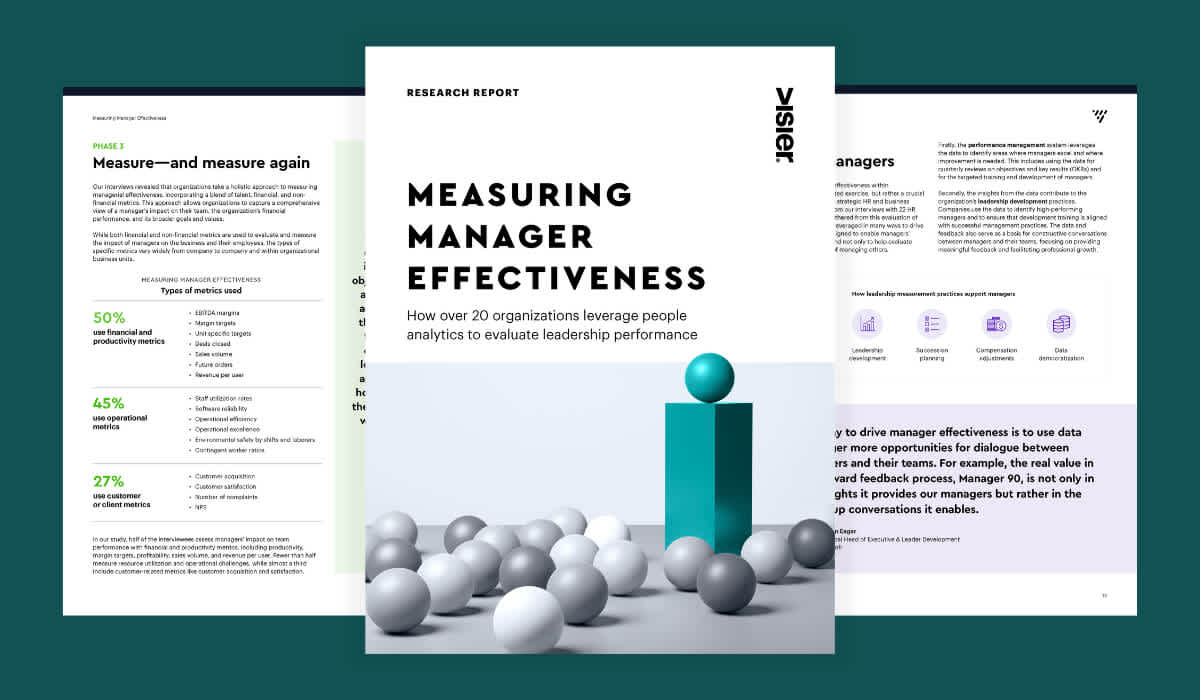Manager Effectiveness: What It Is and How To Improve It
Manager effectiveness is a set of skills, such as communicating and listening, that allow you to empower and support your employees. Learn more.

You might have heard the already classic line “people quit bosses, not companies.” It’s not a cliche—it's an accurate statement. That’s why a manager is a crucial player in any company. Manager effectiveness means being able to empower and support employees, thereby ensuring that they remain satisfied, engaged, and productive.
It includes motivating, communicating, listening, and rewarding direct reports effectively. A good manager will know how to plan goals, and be able to effectively lead the team to ensure they reach those goals.
This article takes a more in-depth look at why manager effectiveness is so important, what makes an effective manager, the top issues managers are dealing with today, and more.
Why is manager effectiveness important?
Manager effectiveness is a key factor for a company’s success. An effective manager is a force that drives its direct reports toward reaching their goals. Benefits include increased productivity and employee engagement, reduced attrition, a positive work environment, and more.
Managers are leaders, so they often set the tone in the organization. Manager effectiveness, therefore, can pave the way to a healthy work environment, where people feel respected, know their voices are heard, and their effort appreciated.

What makes an effective manager?
An effective manager knows how to motivate and support their employees. They’re the driving force behind the team and inspire them through their own work ethics. An effective manager is a confident one. They should be confident in their knowledge, skills, and decision-making abilities, while also giving their employees space to learn, grow, and lead. This confidence—and the balancing act between managing and leading—empowers teams to be the best they can be.
Here are four characteristics any effective manager should have.
1. Supportive and encouraging
Manager effectiveness requires support and encouragement. People who don’t feel supported by their leaders, who never hear words of encouragement, will eventually feel disengaged. They’ll start performing poorly and, in the end, they might leave the company.
Try to identify the strengths of your team and lead them in a way that helps them apply those strengths to each project. In doing so, you’ll help people grow their talent while feeling appreciated.
2. Transparent
Transparency is a key factor in a business and especially for managers. Give honest feedback and be clear about your expectations and goals. This will make employees feel more comfortable. They’ll feel it’s ok to express any concerns because they’ll know you’ll listen and you’re trustworthy.
3. Strong work ethic
As a manager, you lead not only by your words but also by example. That’s why a strong work ethic is a must. Accountability, honesty, discipline, and quality work are only some of the things that make a strong work ethic. Show people that you value hard work and always strive to do your best.
4. Good listener
An effective manager needs to know how to listen to the employees. Encourage them to share their thoughts and listen without judging. Offer honest, constructive feedback that shows them you value their thoughts.
Encouraging this kind of two-way, honest dialogue will not only create trust between managers and employees, it will improve the team’s overall performance. Any team that can analyze, adapt, and react to issues proactively and without fear of backlash will be able to quickly overcome obstacles and learn from their mistakes.
How do you measure manager effectiveness?
You can assess manager effectiveness by looking at various metrics. These include:
Manager engagement score. Just like employee engagement, manager engagement is crucial to the team’s overall success. Before determining red flags here, you may want to look at other metrics as well, such as absenteeism or high-performer resignation rate.
High-performer resignation rate. A clear indication of a problem with manager engagement and satisfaction is when the high-performer resignation rate is greater than the overall resignation rate. If this rate is significantly higher for one manager as opposed to others, you can view it as another red flag.
Promotions rate. If a manager consistently has low to zero promotions in their department, they may be talent hogs. They may deliver results, but they hold back the team members in the process. While this metric doesn’t automatically tell you a manager is ineffective, you may need to investigate matters further.
Employee experience. If you notice a department is consistently unhappy and has various reasons for that frustration, it may be a sign management isn’t great. Dig into the reasons behind this dissatisfaction to understand the root cause of the issue.
On-target delivery. One overrun every once in a while isn’t necessarily a sign of poor management. But when this becomes a regular occurrence, it may be showing you the manager is having difficulties guiding the employees, managing expectations, or setting effective strategies.
Absenteeism. This is a metric that can give you great insights into your company. It can signal problems like low engagement, dissatisfaction with various areas of the job, and even an ineffective manager. Things like an unexpected and unexplained increase in absence in a certain department require further investigation.
In the end, it all comes down to asking some critical questions.
Who is the person employees go to when there is a problem? Do they feel like they can approach the manager? Or, on the contrary, is that the last person they’d go to?
Are you retaining enough top performers? Which managers do that best?
Which managers seem to help employees grow more? Which employees seem to get better each day? Who are their managers?
These questions will help you understand how managers are doing and how effective and engaged they are. Combined with a careful analysis of various metrics, they can show you red flags and potential solutions.
The top issues managers are dealing with today
Managers are more stressed than ever. The pandemic, recession, and the Great Resignation are all things that had and still have a great impact on how we work.
To get a better view of the situation, Visier surveyed 5,000 US-based managers to understand what their biggest stressors and biggest motivators are.
The results revealed 62% of managers are experiencing more stress now than they did a year ago. The first driver of that stress is the potential for recession in 2023.
Overwork is also a major factor. 32% feel they have too many direct reports, and the same percentage agrees they currently have too many responsibilities.
High attrition rates don’t mean only more work for the managers that remain. They also mean more time spent hiring and onboarding new people, which impacts ongoing productivity and the company’s bottom line.
Finally, employees have very high expectations nowadays. Transparency, honesty, merit increases, and emotional support, are just some of the things that managers need to prioritize.
Managers are often spread too thin, lacking the time and resources to do everything that’s required of them.

5 tips to improve manager effectiveness in your organization
It’s clear that an effective manager can make the difference between a team that reaches its goals and performs well and one that doesn’t. But how can you improve manager effectiveness? Here are five things you can try.
1. Be a good listener
Good communication can help in many areas: it can boost engagement, offer emotional support, increase transparency, and help people feel heard.
That’s why it’s important to make communicating with your direct reports a priority. Create various channels for people to come to you. Not everyone has the same personality. One person might feel comfortable approaching you during a coffee break, others might not.
While doing so, make sure people feel heard. Be open to their feedback, but be ready to offer yours. Do so in an objective, constructive manner that will help everyone win. Your employees will become better and the business will be more productive.
2. Celebrate milestones and top performers
Reaching milestones is always worthy of celebration. You don’t have to throw a party. But you can and should acknowledge the team did a good job.
When possible, go the extra mile and recognize top performers. Positive feedback, a merit increase, a promotion, or even small company awards, will help people feel appreciated for their hard work.
3. Lead by example
If you expect hard work from your employees but aren’t willing to do any yourself, you might set yourself up for failure. Lead by example and be exactly as you expect your direct reports to be.
This includes demonstrating positive work-life balance and mental health to your direct reports. Be vocal about when you—and by extension they—should shut down for the day or weekend, and when it feels like someone may need a vacation. Make it clear that it’s better to take time off than it is to burn out.
4. Set SMART goals
Without strong goals to work towards, your employees may feel lost, like they lack proper guidance. Don’t set just any goals, though.
Make them SMART—Specific, Measurable, Attainable, Relevant, and Time-based. These will help your direct reports feel focused. It will give them direction and a path for their work.
5. Be open to improving
You can’t expect your employees to always strive to be better if you don’t do the same. Be open to feedback and see where there’s room for improvement.
Investing in yourself, in things like coaching, can help you improve your leadership skills. It can help you become a better communicator and listener, and make better decisions and plans.

Key takeaways
Manager effectiveness is a set of skills that allows you to empower and support your employees. Being a team player, a good listener, and having a strong work ethic that allows you to lead by example are some of the things that make an effective manager.
Managers are dealing with more stressors than ever before. For that reason, being open to feedback, knowing when to delegate tasks, and celebrating your top performers are crucial to a successful business. You’ll be able to manage the workload with more ease and have a better relationship with your direct reports.
Improving manager effectiveness is not something that will happen overnight. It is a constant effort, and it requires being ready to get better and grow at all times.


